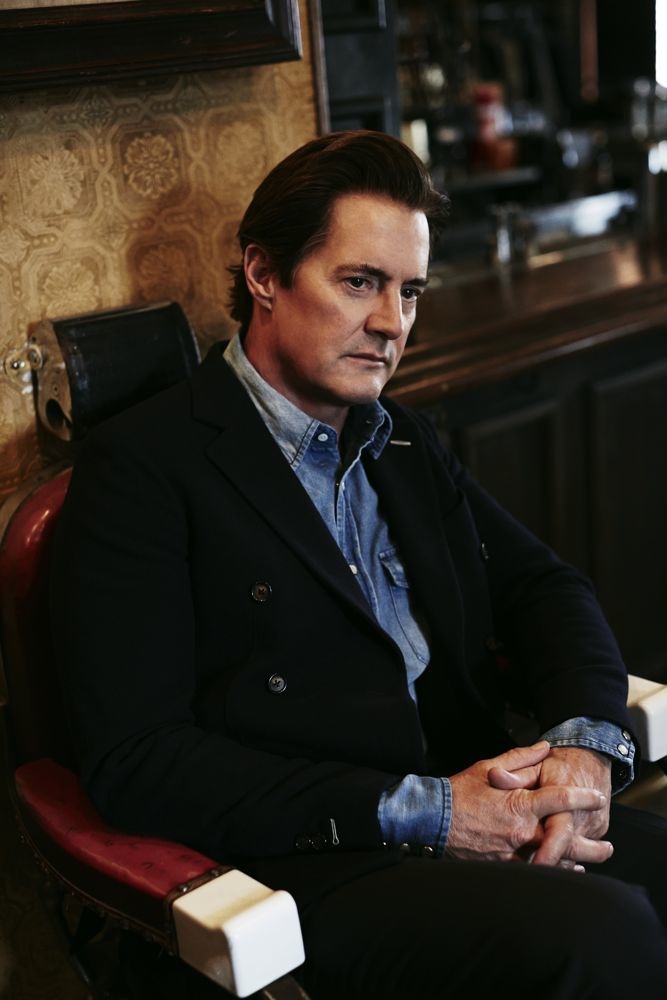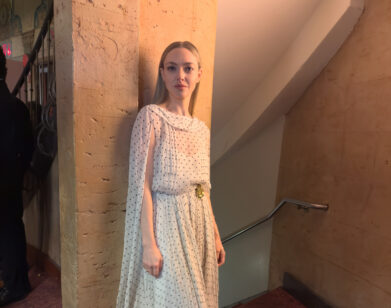Kyle MacLachlan, Renaissance Man
KYLE MACLACHLAN AT BUTCHERS & BARBERS IN LOS ANGELES, MAY 2015. PHOTOS: GUY LOWNDES. STYLING: ANDA & MASHA. GROOMING: THEA ISTENES FOR EXCLUSIVE ARTISTS MANAGEMENT USING ORIBE HAIR CARE.
Ask a group of strangers to cite actor Kyle MacLachlan’s most famous role, and they’ll each give you a different answer. For some, he’ll always be the Dale Cooper, the earnest, eccentric FBI special agent who appreciates a “damn good coffee” from David Lynch’s surrealist soap Twin Peaks. For others, he’s still Trey MacDougal, Charlotte’s WASP-in-shining armor-turned-catastrophic-disappointment in Sex and the City. Or Jeffrey Beaumont, the college student protagonist of Blue Velvet; Orson Hodge, Bree’s second husband in ABC’s Desperate Housewives; Zack Carey from the much-ridiculed Show Girls; Calvin Zabo, the father of Skye in Agents of S.H.I.E.LD.; the reggae-loving Mayor of Portland on IFC’s sketch comedy Portlandia; or, most recently, “Dad” in Pixar’s latest hit film Inside Out. Others still will know him for his wine label, Pursued by a Bear.
Now in his mid-50s, MacLachlan is taking well-deserved summer break before returning to Portlandia. In the autumn, he’ll resume his role as Dale Cooper, last seen in the 1992 film Twin Peaks: Fire Walk with Me, for Showtime’s reboot David Lynch’s cult series. After much back-and-forth, Lynch is confirmed to write the new season.
Here, MacLachlan talks to his friend and Portlandia co-star and writer Fred Armisen.
KYLE MACLACHLAN: You’re in Portland, right? Are you guys up there writing?
FRED ARMISEN: I’m in Portland; we’re writing. We’re writing for you.
MACLACHLAN: Ooh.
ARMISEN: I expect to be seeing you here.
MACLACHLAN: I’m very excited to come up. I’m in New York just waiting to come to Portland.
ARMISEN: I have a nickname for that city… the big apple.
MACLACHLAN: [laughs] Not just a medium apple. The big apple.
ARMISEN: A big one. Why are you in New York? What are you working on?
MACLACHLAN: I’m hanging out with the family this summer. I finished my job on Agents of S.H.I.E.L.D., which was filming in Los Angeles, and was a lot of fun. They were very accommodating; I would come out to Los Angeles for two or three days at a time and do my bits and then jump on a plane and fly back to New York. Now I’m enjoying the Pixar film [Inside Out]. Some SNL castmates of yours are also in it—Amy Poehler and Bill Hader—so I felt still part of the SNL universe even though we weren’t necessarily working together.
ARMISEN: It feels to me you’re part of that extended SNL family—your relationship with Lorne [Michaels], and then you’re doing Portlandia, and when you hosted SNL…
MACLACHLAN: That starts from Lorne, really. If you’ve been on the show, or hosted the show, or done something with the show, it feels that’s something that you’re always going to be connected somehow. You must still feel roots there. It’s different, but still there’s a connection, right?
ARMISEN: All the time. When I was leaving the show, or thinking about it, Amy Poehler, who had left the show earlier, told me as much. She said, “Once you go, don’t worry, the show will always be in your life. Lorne will always be in your life.” It turned out to be true—either socially or work-wise you end up with those people. So, Kyle, you’re really killing it. You’re doing so many projects between the Pixar movie and Peaks and Agents of S.H.I.E.L.D. I was thinking of saying you’re on a roll, but then you’ve always been on a roll. I’ve never known you to not be in some universe of doing cool projects.
MACLACHLAN: There have been many occasions when it’s been quiet, like “whatever happened to…” kind of moment. [laughs] I think they come and go. I should say the same about you: you’ve got a lot of exciting things—obviously apart from Portlandia—you just came up with something with Seth [Meyers].
ARMISEN: I have a question. When you go from job to job, what do you find directors like most about you? “Oh, they want me to do this thing again…” Is there anything you feel is a surprise calling card for what you do?
MACLACHLAN: I guess a big part of it is my relationship or my connection with David Lynch. I always think, “Oh, they were affected by something that David Lynch did that I was in so they’re curious.” They think, “He’s kind of odd; he’s a little unusual; he’s a little quirky.” I’m here on the other side going, “I guess so.” I don’t really think of myself as quirky; I have sort of an unusual sense of humor. I was thinking about this the other day—what makes me laugh? When you see something funny, do you laugh or do you go, what I do, “Man, that is funny”? Rarely do I find myself just bursting out laughing, unless it’s Harvey Korman and Tim Conway. They make me laugh. Or, I’m sitting at dinner with my brothers and we’re talking about something that our father did when we were 10 that was hilarious to us. Or maybe something from Monty Python. What makes you laugh?
ARMISEN: You’re exactly right. There are two different things: saying, “This is funny” when I look at it, and then actually laughing. That’s if I see an old friend of mine. Say I’m sitting with Maya Rudolph or something, and they’ll say something where I truly, truly laugh. I was looking at a website that was people posing with statues—they were just tourists; they’d go to Norway or something and pretend they’re in a fight with a statue. I could hear myself laughing in the apartment; I could hear my laughter bouncing off the walls. I think it all counts; I think it’s all legitimate: finding something funny, forensically, and then the actual laughter. Two different, valid things.
MACLACHLAN: Because when we work together—I’m thinking back to the scene where we’re chasing through how we’re going to do the video…
ARMISEN: The conspiracy video.
MACLACHLAN: And then it trails off into this odd, sort of Napoleonic weird thing. Carrie [Brownstein] and I are always on the verge of laughing, and you are like the Rock of Gibraltar—so solid. I can only remember one time when you actually broke—the Brando thing. [laughs] There was a snort that you did, and I realized, “Ah, Fred, what got him!” Not that that’s the goal of the scene, of course, but sometimes it becomes inevitable, and you are so solid it’s unbelievable to me. You’re very, very hard to break.
ARMISEN: Well, trust me, I’m bubbling under. When you guys are going it’s very close. It takes a lot of effort.
MACLACHLAN: But you asked a question before about that: I don’t know what directors think, honestly. I just come in and I’m like, “I like this, this is a good role.”
ARMISEN: Well, for me, what I like about you—or, rather, love about you—[is that] you have an unaffected pleasantness that’s not cynical, that’s not ironic; there’s no message in it. You deliver in such a pleasant and friendly way. I think that’s a huge feat. I think a lot of people try to take on too much and they complicate it. Everything that comes out of your mouth, I believe it. It’s like a ginger ale or something: perfectly sweet, but not overly sweet. You seem well adjusted, you seem happy, you seem like you’ve got a good work ethic. When you were in Yakima, were you the same kind of person? If I were to meet you when you were 20, or as a teenager.
MACLACHLAN: I’m pretty, for lack of a better word, happy-go-lucky. I take things very seriously, but I’m very aware of people around me. I like to be part of a group that’s working together towards something positive. I’m not really the leader, or, if anything, I’d like to lead by example, as opposed to, “My way is the right way, so follow me.” I think that’s why I like television work so much; I find it very collaborative. I like the meeting of the minds and figuring out a scene. I’m not that interested in directing; I’m not that interested in producing. I like getting the story, getting the character, and then diving in like it’s a giant, 2000-piece puzzle and looking at all the pieces and putting them all together. When I think back to when I first came to Hollywood and I did Dune, there was all this expectation. The movie came out and was kind of panned, and my stock went from a great potential to zero overnight. I took it in stride: “Well, I didn’t have anything to begin with. We’ll just see how it goes.” I was always been pretty upbeat.
ARMISEN: That’s a surprise to me that Dune was perceived as something that would decrease your value. I’d see it as something increasing your value, because suddenly you’re part of something. Panned or not, Dune is a real part of science-fiction filmmaking. All of a sudden, you’re this guy from Dune, whatever it is that they say.
MACLACHLAN: The books meant a lot to me when I was young; I really knew them well. I read them at 15, 16. I read them many times, which is kind of weird that it came to me when I was 23. That appreciation has grown overtime, which has been wonderful. And there were so many wonderful things that came from that, but what I was speaking more towards was the Hollywood perception, or that “bankability” thing they talk about: “Here’s a young potential actor, what’s going to happen?” and then it went “Pssh.” Bless David Lynch’s heart, he hired me then for Blue Velvet, and changed, in a pretty great way, the track of my career. It went from Hollywood blockbuster star to independent, really eccentric, out-there movie Blue Velvet. It was a blessing, because I don’t think I could ever have been that [Hollywood blockbuster] guy.
ARMISEN: It’s really interesting that you say you don’t know what drove you.
MACLACHLAN: Do you feel that way?
ARMISEN: Totally! It doesn’t feel like, “I’m great. I need the world to see how great I am.” It’s almost as if you’re a little kid, “I want to be in that playground with everybody.”
MACLACHLAN: Yeah, you want to play in that world. And that is the fun thing. Every time there’s a new job it’s like, “Jeez, am I going to be okay? Am I going to remember what to do?” There are always those insecurities that creep in, but [then there’s] the pleasure of being able to really dig into something. I did a pilot a couple years back with Alfonso Cuarón; he had done Gravity, but it hadn’t come out yet. He had such pleasure in the process. Not only was he smart, and super tuned-in, but he loved it. He loved filming and filmmaking, and the process: working with actors, staying up late, working long hours. That’s how I feel: I just love it! And the great ones are like that. David Lynch is very much like that. [John] Frankenheimer was a madman, but same thing: passion, just loved it, couldn’t stop working, loved the whole process. It’s the same when I come to work on Portlandia.
ARMISEN: What is next for you? Twin Peaks hasn’t started yet, right?
MACLACHLAN: No we haven’t started; from what Dave said we’ll start in the fall. Apart from Portlandia, that’s what’s next on the horizon.
ARMISEN: You can’t disclose anything, I understand, but where will you be? Does it seem like it will be California, West Coast, Canada?
MACLACHLAN: I know the first part of it, the plan is to start in the Seattle area, somewhere in Pacific Northwest. Probably similar to where we were when we were doing the pilot. After that, I’ve heard California, but that is as much as they’ve said to me. They’ve deliberately kept things very close to the vest.
ARMISEN: That’s good. That’s exciting. They’re not giving away too much.
MACLACHLAN: I think so too. That’s the whole thing about the show: all the mystery. It’s fun to be able to maintain that as long as I can. It’s a completely different world now from when we did the pilot, with social media and so much attention focused on the business.
ARMISEN: I haven’t seen anything that seemed too secret. Someone is doing a good job in maintaining all of that, you know.
MACLACHLAN: Keeping it tight. What can you tell me about—are there things for the mayor to do? Or should we let those be mysterious?
ARMISEN: It’s going to be a little different in a really good way. We’re adding some more personality things to the character, and history.
MACLACHLAN: Oh, good! When you hand me the material, or the idea, it’s always just completely unexpected. I’m like a little kid, reacting like you just told me we could go to Disneyland for two weeks straight. The idea of playing in a reggae band, or going off the grid into Apocalypse Now territory. Or the fact that Mike Nesmith is going to be my dad. That stuff just kills me. I love it.
ARMISEN: I don’t know anything about the wine world at all. I don’t even know where to begin: do you go to a vineyard and say, “Hi, let’s make some wine together”? What’s the starting point? What’s that first meeting?
MACLACHLAN: It’s kind of why I got involved. I was like “How do you make it? Why is this wine good and this wine okay?” I enjoy drinking wine, and I had some friends who were in the wine business, but I wanted to learn more. Being from eastern Washington, I was aware that the whole area was developing quickly into a really great wine region. I reached out, met a couple of people, and completely by chance met Eric Dunham at Dunham Cellars. He agreed to partner with me on a little wine that we made together. We made 12 barrels the first year, 2005, which was about 300 cases. It was so much fun, and so much about people, about reaching out and connecting and sitting down and talking about the wine. It’s creative, but I don’t have to talk about myself, and that was great.
ARMISEN: It must have been a really nice feeling when the first printed label was put on a bottle—your first Pursued by Bear, like this is it.
MACLACHLAN: It was amazing. I remember I was actually at a food and wine festival in Beaver Creek, and I got a call: “You’ve got to check Wine Spectator.” So I looked through, and in the ratings area, near the back of the magazine, there I saw “Pursued by Bear, 91.” I had the craziest reaction to it; I said, “Oh my god, somebody else has a wine named Pursued by Bear. That’s incredible!” And I was like “Wait. That’s my wine.”
ARMISEN: Which means also that there are people out there that don’t know that it’s you who made this wine. To them, it’s, “I like this brand, or this company.”
MACLACHLAN: I was like, “I can put my name on it, but it will sound like a scotch.” [laughs]
INSIDE OUT IS OUT IN THEATERS ACROSS THE U.S. NOW. BOTH TWIN PEAKS AND SEASON SIX OF PORTLANDIA ARE DUE OUT IN 2016.







